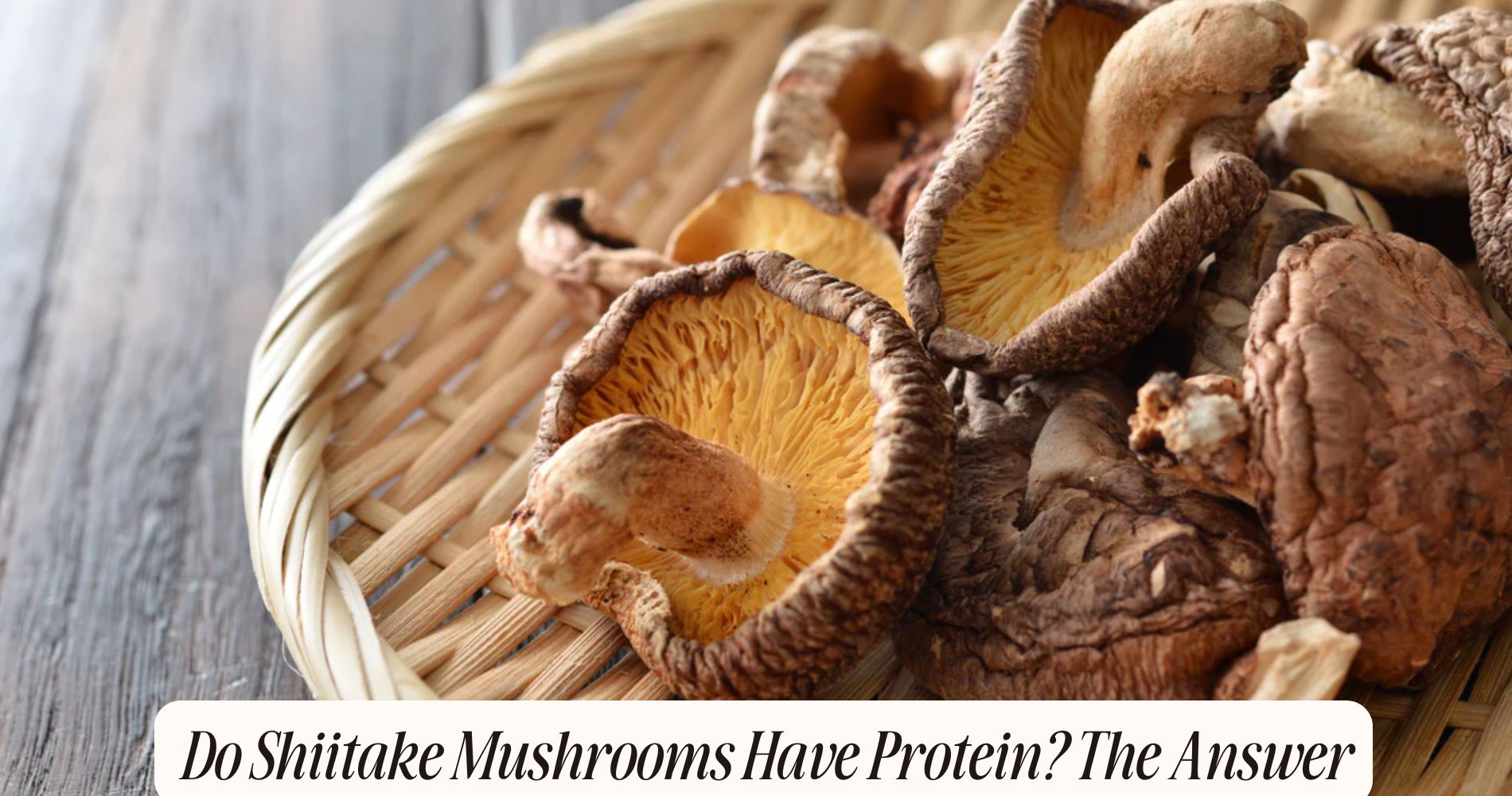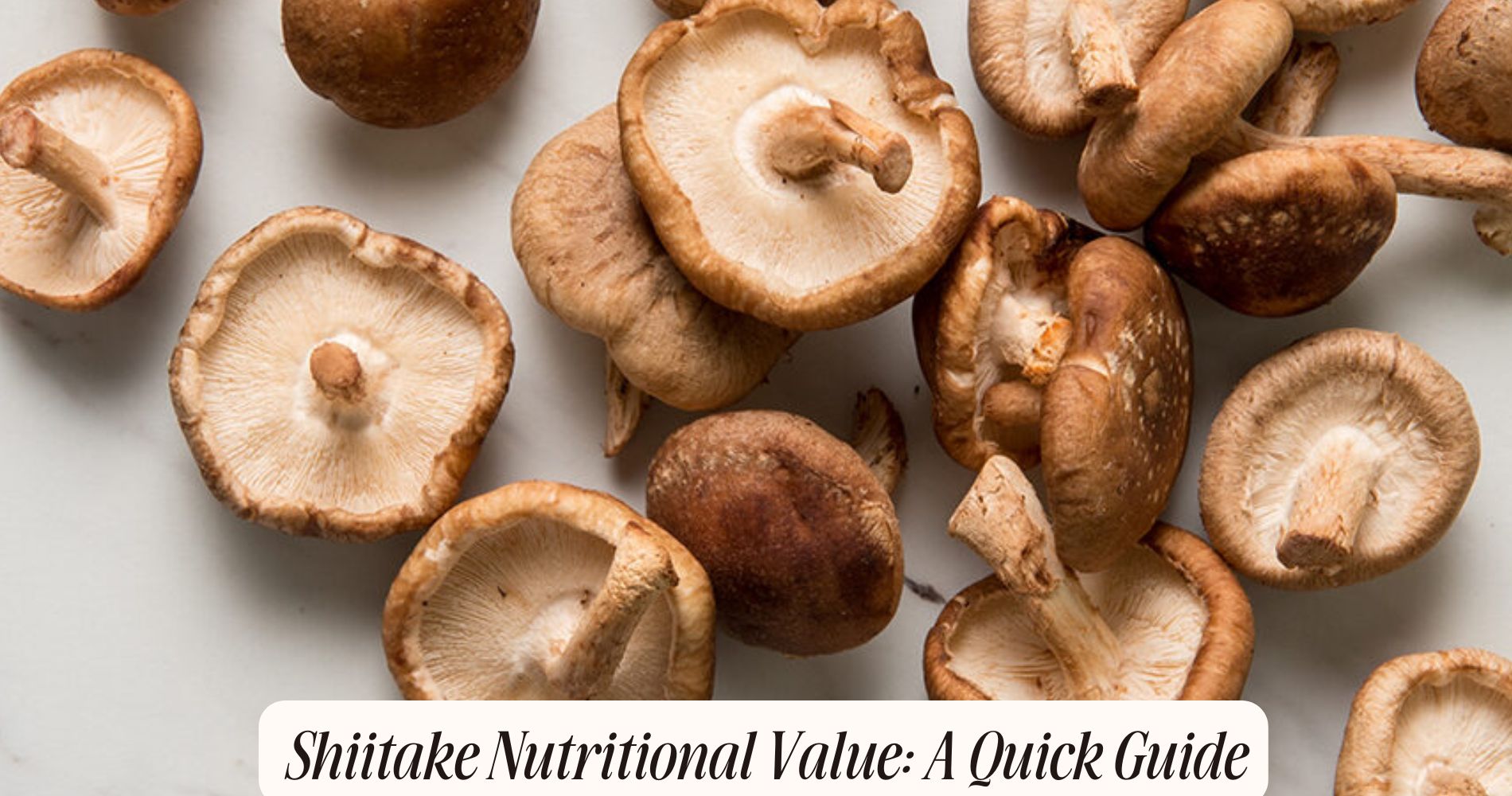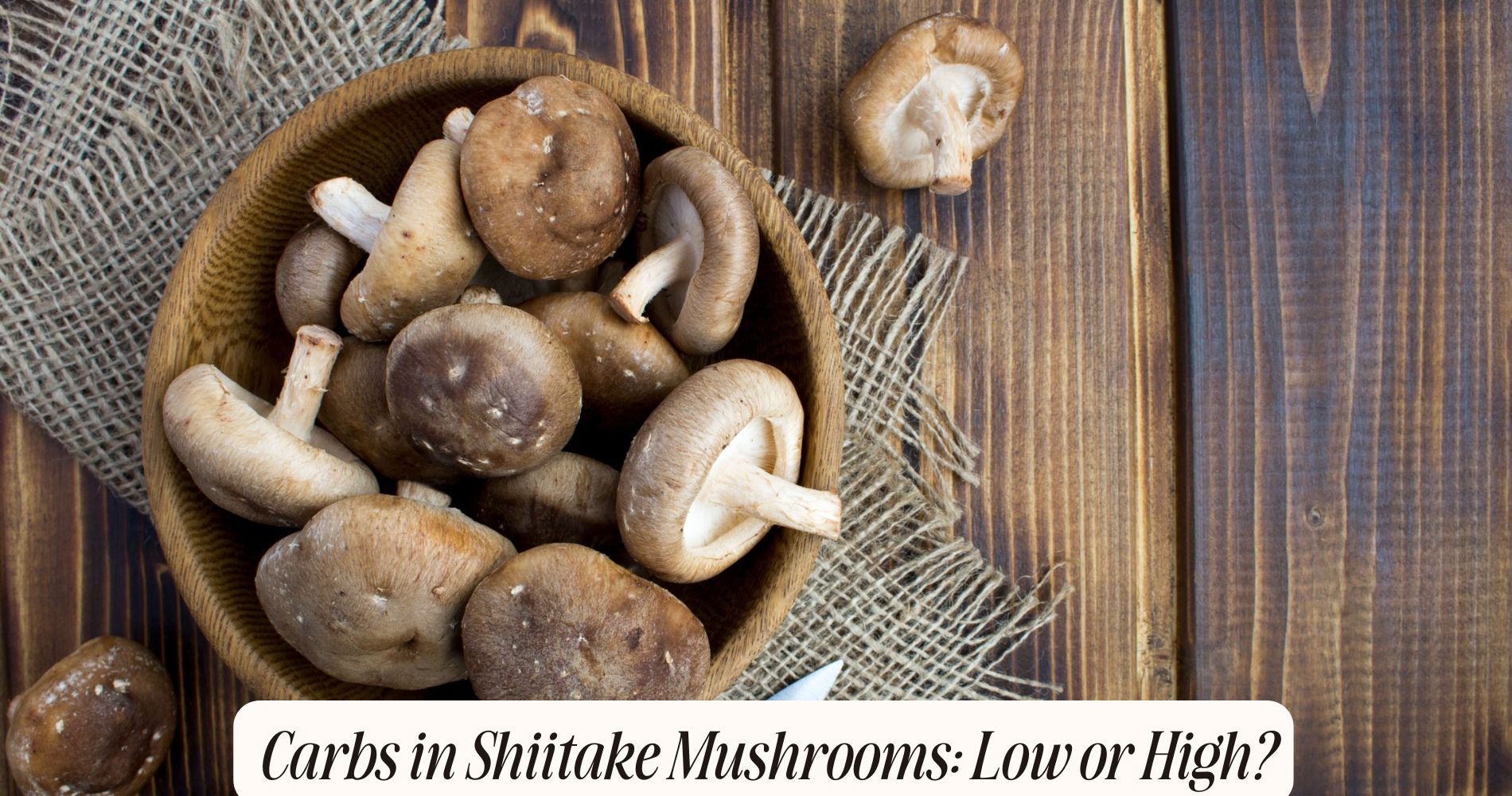
Do Shiitake Mushrooms Have Protein? The Answer
Do shiitake mushrooms have protein? Yes, shiitake mushrooms do contain protein. You'll find about 2.2 grams of protein per 100 grams, making them a valuable plant-based protein source. While this isn't as high as other mushrooms like white button or portobello, shiitakes are still significant compared to many vegetables. They offer essential amino acids that are important for muscle repair and overall health. Plus, their rich flavor enhances a variety of dishes, making it easy to incorporate them into your meals. If you want to explore more about their benefits and cooking ideas, there's plenty more to discover.
Nutritional Overview of Shiitake
When you plunge into the world of shiitake mushrooms, you'll discover a rich nutritional profile that makes them a valuable addition to your diet. These mushrooms are low in calories yet packed with essential nutrients, including vitamins B and D, as well as minerals like selenium, copper, and potassium.
The shiitake benefits extend beyond mere nutrition; they contain compounds that may support immune function and reduce inflammation.
Moreover, shiitake mushrooms are a sustainable food choice. They can be cultivated on various substrates, including agricultural waste, which means they require fewer natural resources compared to many other food sources. This sustainable approach not only minimizes environmental impact but also promotes biodiversity.

Incorporating shiitake mushrooms into your meals can enhance your diet while supporting eco-friendly practices. From stir-fries to soups, these flavorful mushrooms add depth and nutrition to various dishes.
Protein Content in Shiitake Mushrooms
Shiitake mushrooms offer a surprising source of protein for a vegetable, containing about 2.2 grams of protein per 100 grams. This protein content makes them one of the significant mushroom varieties for those seeking plant-based protein sources.
Though they may not compete with meat or legumes in protein density, shiitake mushrooms can still contribute to your overall protein intake, especially if you incorporate them into your meals regularly.
In addition to their protein content, shiitake mushrooms are rich in essential amino acids, which are vital for muscle repair and overall health. Their unique flavor adds depth to various dishes, making them a favorite among culinary enthusiasts.
You can use them in stir-fries, soups, or even as a meat substitute in various recipes.
While shiitake mushrooms aren't the highest protein sources available, their nutritional profile, coupled with their versatility in cooking, makes them a valuable addition to your diet.
Comparison With Other Mushrooms
While shiitake mushrooms offer a significant protein content, it's beneficial to compare them with other mushroom varieties to see how they stack up nutritionally. Shiitake varieties, for instance, contain about 2.2 grams of protein per 100 grams. In contrast, white button mushrooms provide around 3.1 grams, while portobello mushrooms contain about 2.5 grams of protein in the same serving size.
When examining mushroom proteins, it's important to evaluate the amino acid profiles. Shiitake mushrooms are known for their rich content of certain amino acids, including lysine and leucine, which are vital for muscle repair and growth. On the other hand, oyster mushrooms also present a good amino acid profile, with protein content similar to shiitake.

Additionally, when you're looking for nutritional diversity, enoki mushrooms come into play. They contain slightly lower protein levels at about 2.7 grams per 100 grams but boast high levels of antioxidants.
Each variety brings unique benefits to the table, so incorporating different mushrooms into your diet can enhance not just protein intake but overall nutrition as well.
Benefits of Plant-Based Proteins
Plant-based proteins offer a wealth of nutritional benefits that can enhance your overall health.
They provide essential amino acids, are often lower in calories and saturated fats, and can reduce the risk of chronic diseases.
Plus, their versatility makes it easy to incorporate them into a variety of meals, allowing for a balanced and satisfying diet.
Nutritional Value Overview
Nutrition plays a critical role in maintaining overall health, and understanding the benefits of plant-based proteins can enhance your dietary choices. Shiitake mushrooms, with their rich shiitake origins in East Asia, offer a flavorful addition to your meals while providing essential nutrients. Their culinary history dates back centuries, where they've been celebrated not only for their taste but also for their nutritional value.
These mushrooms are low in calories yet pack a punch with essential nutrients, including fiber, vitamins, and minerals. While they contain protein, it's significant to highlight that shiitake mushrooms aren't a complete protein source. However, they can still contribute to your daily protein intake, especially when combined with other plant-based foods.
Incorporating shiitake mushrooms into your diet can enhance your meals while promoting a balanced nutrition profile. Their umami flavor can elevate various dishes, making it easier to enjoy a diet rich in plant-based proteins.
Health Benefits Explained
Exploring the health benefits of plant-based proteins reveals a wealth of advantages for your overall well-being. Shiitake mushrooms, a great source of these proteins, provide essential nutrients that can enhance your health. One significant benefit is their ability to support your immune system. The unique compounds found in shiitake mushrooms, like lentinans, can boost immune function, helping your body fend off infections more effectively.
Additionally, shiitake mushrooms possess impressive antioxidant properties. Antioxidants are vital for neutralizing free radicals in your body, which can lead to cellular damage and various chronic diseases. By incorporating shiitake mushrooms into your diet, you can increase your intake of these powerful antioxidants, promoting better health and longevity.
Furthermore, plant-based proteins are often lower in saturated fats compared to animal proteins, making them heart-healthy options. They can also aid in weight management by promoting satiety, helping you feel full longer.
Versatility in Diet
Incorporating shiitake mushrooms into your meals not only enhances flavor but also offers remarkable versatility in your diet. These mushrooms can easily fit into various shiitake recipes, making them a fantastic addition to both vegetarian and omnivorous meals.
With their rich umami taste, they can serve as a meat substitute in dishes like stir-fries, soups, and pasta. By using shiitake mushrooms, you gain dietary flexibility, allowing you to create nutritious meals without sacrificing flavor.

They're not just a source of protein; they also provide essential vitamins and minerals, such as B vitamins and selenium. This makes them a smart choice for anyone looking to incorporate more plant-based proteins into their diet.
Whether you're sautéing them with vegetables or adding them to a savory stew, shiitake mushrooms can transform simple dishes into culinary delights.
Plus, their adaptability means you can experiment with various cuisines, from Asian to Mediterranean, enhancing your meals while maintaining a balanced diet.
Incorporating Shiitake Into Meals
When it comes to enhancing your meals, shiitake mushrooms can be a versatile and flavorful addition. Packed with nutrients, including protein, these mushrooms can elevate your dishes while contributing to overall health. Incorporating shiitake into your meal prep is simple and rewarding.
You can easily add shiitake mushrooms to stir-fries, soups, or salads. For a quick meal, consider shiitake recipes like a savory stir-fry with seasonal vegetables and a protein source like tofu or chicken. Just sauté sliced shiitake in a bit of oil until they're tender, then mix in your chosen ingredients.
If you're looking for something heartier, shiitake can star in a creamy risotto or be blended into pasta sauces, adding depth and umami flavor. You can also roast them for a tasty side dish, enhancing their natural sweetness.
Don't forget about incorporating dried shiitake mushrooms, too; they can bring a concentrated flavor to dishes. By experimenting with different shiitake recipes, you'll discover countless ways to include these nutritious mushrooms in your meal prep, making your meals not only delicious but also wholesome.
Cooking Methods for Shiitake
When it comes to cooking shiitake mushrooms, you've got several effective methods to choose from.
Sautéing brings out their rich umami flavor, while grilling adds a smoky depth that enhances their natural taste.
Stir-frying is another quick technique that retains their texture and nutritional value, making them a versatile ingredient in your meals.
Sautéing Shiitake Mushrooms
Sautéing shiitake mushrooms is a quick and effective way to enhance their rich flavor and meaty texture. To get started, you'll want to use fresh shiitakes, as their quality greatly impacts the final dish.
Begin by cleaning the mushrooms with a damp cloth; avoid soaking them in water to prevent them from becoming soggy.
When it comes to sautéing techniques, heat a skillet over medium-high heat and add a bit of oil, such as olive or sesame oil. Once the oil is hot, toss in the shiitake mushrooms in a single layer. This allows for even cooking and prevents steaming.
Sauté the mushrooms for about five to seven minutes, stirring occasionally, until they become golden brown and tender.
For flavor enhancements, consider adding minced garlic or shallots to the pan during the last couple of minutes of cooking. A splash of soy sauce or a sprinkle of fresh herbs can elevate the taste even further.
Grilling for Flavor
Grilling shiitake mushrooms is a fantastic way to amplify their earthy flavors while adding a delightful smoky char. When you employ effective grilling techniques, you can enhance the natural umami taste that shiitakes are known for.
Start by marinating the mushrooms in a mixture of olive oil, garlic, and your favorite herbs for about 30 minutes. This not only infuses extra flavor but also helps to prevent them from drying out on the grill.
Preheat your grill to medium-high heat, ensuring the grates are clean and well-oiled. Place the shiitakes directly on the grill or use a grilling basket to keep smaller pieces secure. Grill for about 5-7 minutes on each side, turning them until they develop a beautiful golden color. The key is to watch closely, as overcooking can lead to a chewy texture.
The result? A mouthwatering side dish or topping that elevates your meals.
Whether you're adding them to salads, pizzas, or pasta, grilled shiitake mushrooms provide both flavor enhancement and a nutritious boost, making them an excellent addition to any dish. Enjoy the rich taste and health benefits they offer!
Stir-Frying Techniques
After enjoying the smoky flavors of grilled shiitake mushrooms, you might want to explore stir-frying as another fantastic cooking method. Stir-frying not only cooks shiitakes quickly but also enhances their natural umami flavor.
To master this technique, gather your stir fry essentials: a hot pan or wok, oil with a high smoke point, and fresh vegetables to complement the mushrooms.
Start by slicing your shiitakes into uniform pieces for even cooking. Heat the oil until it shimmers, then add the mushrooms, letting them sizzle for a minute. This initial sear promotes flavor enhancement, locking in moisture while creating a delightful texture.
Next, toss in your choice of veggies—bell peppers, snap peas, or broccoli work wonderfully. Keep the ingredients moving to prevent sticking and guarantee even cooking.
After a few minutes, add your favorite stir-fry sauce, like soy or teriyaki, to elevate the dish. Stir-frying mushrooms allows you to enjoy their robust taste while benefiting from a quick, healthy meal.
Potential Allergies and Considerations
When considering shiitake mushrooms as a protein source, it's crucial to be aware of potential allergies and individual sensitivities. Some people may experience allergy symptoms after consuming shiitake mushrooms, including skin reactions, gastrointestinal distress, or respiratory issues.
If you're new to eating shiitake mushrooms, start with a small portion to assess your tolerance.
Cross reactivity concerns are also worth noting. If you have allergies to other fungi or molds, you might be at a higher risk for reactions to shiitake mushrooms. It's vital to consult with a healthcare provider if you have a known history of such allergies.
While shiitake mushrooms can offer health benefits, including their protein content, you should prioritize your well-being. Always listen to your body's signals, and don't hesitate to seek medical advice if you suspect an allergy.
Supercharge Your Day with Well Gummies' Ultimate Wellness Bundle
If you're looking to enjoy the benefits of mushrooms in an easy, delicious form, the Ultimate Wellness Bundle by Well Gummies is your perfect solution. With All-in-One Mushroom Gummies for daily use and Lion's Mane Focus and Energy Gummies for an extra boost, this bundle supports daily vitality, brain function, and immune health. Packed with 10 powerful mushrooms, these vegan gummies offer calm energy, sharper focus, and a balanced body, all in a fresh wild berry flavor that tastes as good as candy—without the jitters or crash. Shine all day with Well Gummies!
Frequently Asked Questions
Can Shiitake Mushrooms Help With Weight Loss?
Yes, shiitake mushrooms can aid in weight management. Their low calorie count and high fiber content promote satiety, helping you control cravings. Plus, the shiitake benefits include boosting metabolism, making them a smart addition to your diet.
Are Shiitake Mushrooms Safe for Children?
Yes, shiitake mushrooms are safe for children when cooked properly. They offer nutritional benefits like vitamins and minerals. You can sauté, grill, or add them to soups for a delicious, healthy meal your kids will enjoy.
How Can I Store Shiitake Mushrooms?
To store shiitake mushrooms effectively, place them in a paper bag in the fridge for best storage. This method guarantees mushroom preservation by allowing air circulation, preventing moisture buildup, and keeping them fresh longer.
Do Shiitake Mushrooms Have Any Side Effects?
While shiitake mushrooms offer numerous benefits, some people may experience allergic reactions or digestive issues. It's important to contemplate shiitake precautions, especially if you have allergies or take certain medications. Always consult a healthcare professional if unsure.
Can I Eat Shiitake Mushrooms Raw?
You can eat shiitake mushrooms raw, but cooking enhances their flavor and nutritional benefits. Raw consumption might not provide the same depth of taste or digestibility, so consider sautéing them for a better culinary experience.
Conclusion
Incorporating shiitake mushrooms into your diet not only boosts flavor but also adds a healthy source of protein. With about 2.2 grams of protein per 100 grams, they're a great addition for those seeking plant-based options. Their nutritional benefits, combined with versatility in cooking, make them a fantastic choice for a variety of meals. Just be mindful of potential allergies, and enjoy the unique taste and health perks shiitake mushrooms bring to your plate.




